Reviewed by Dr. Fiona Lee
Human foods can be a delightful treat for your dog or a hidden danger. Many common household foods, while perfectly safe for humans, can cause severe illness or even be fatal for dogs, even in small quantities. Understanding what are foods that dogs can’t eat is crucial for every pet owner. With over 400,000 pet poisonings reported annually in the United States, common foods play a significant role in these incidents, highlighting the critical need for awareness and preventative measures.
Being well-informed about foods to avoid and what food dogs can’t eat versus those your dog can safely consume is essential. This guide serves as your go-to resource to help keep your furry companion healthy and out of harm’s way.
Why Certain Foods Are Toxic to Dogs
A key question many pet owners ask is, “What can dogs eat and not eat?” The answer lies in the fundamental differences between canine and human digestion and metabolism. Dogs process some substances in a unique way, making many human foods dangerous for them.
For instance, theobromine and caffeine found in chocolate are metabolized much slower in dogs than in humans. This delayed processing allows these substances to accumulate rapidly in their system, potentially leading to fatal consequences. Similarly, while humans can easily digest cherries, the cyanide present in their pits, stems, and leaves can pose a problem if ingested in large amounts by a dog. Cherry pits are also difficult for dogs to digest and can cause diarrhea, making it best to avoid them altogether.
Food toxicity can also vary significantly based on a dog’s size, breed, and existing health conditions. Therefore, if you have any doubts or questions about specific foods your dog cannot eat, always consult your veterinarian for expert advice.
List of Common Foods Dogs Cannot Eat
Many household foods are not only dangerous but often toxic to dogs. Some of the most frequently encountered foods that are bad for dogs include alcohol, avocados, macadamia nuts, grapes and raisins, xylitol, and chocolate. It is vital for your dog to avoid all the items listed below. This list comprehensively addresses what a dog can’t eat, though it is important to remember it is not exhaustive.
Alcohol
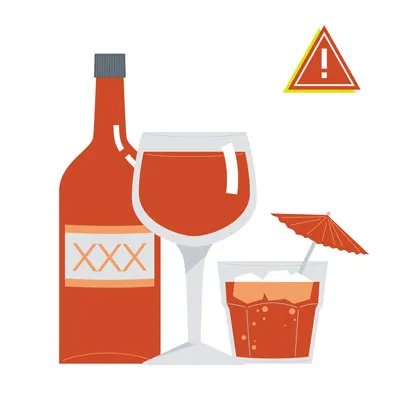 Alcoholic beverages and a dog's bowl on a kitchen floor, highlighting dangers
Alcoholic beverages and a dog's bowl on a kitchen floor, highlighting dangers
Due to their smaller size compared to humans, alcohol can have a much more severe and potentially deadly effect on cats and dogs. Even tiny amounts of alcohol can cause harm, with smaller pets being at greater risk. Symptoms of alcohol poisoning in dogs mirror those in humans, including vomiting, breathing difficulties, coma, and even death.
Apple, Apricot, Cherry, and Plum Seeds/Pits
While the fleshy parts of apples are generally safe for dogs, the core and especially the seeds are not. Apple seeds contain cyanide; although small amounts might not immediately be fatal, it is always safest to avoid the core and seeds entirely. Similarly, apricot, cherry, peach, and plum seeds and pits should be strictly avoided. These fruit pits also contain cyanide, which can lead to severe symptoms such as vomiting, irregular and rapid heartbeat, seizures, coma, and even death. This is due to the cyanide’s effect on red blood cells, impairing their ability to carry oxygen effectively.
Avocado
Avocados are not a suitable food choice for dogs. There have been documented cases, such as two dogs in South Africa that tragically died from myocardial damage after consuming avocados. While this specific outcome hasn’t been replicated, avocados are known to cause issues in other mammal species. Furthermore, an intact avocado pit can cause a dangerous gastrointestinal tract obstruction if swallowed by a dog. For these reasons, it is best to completely avoid feeding avocado to your pet.
Broccoli
Broccoli contains isothiocyanates, compounds that can be harmful to pets if consumed in very large doses. While very small amounts of broccoli might be acceptable on rare occasions, it’s generally wiser to avoid it given the abundance of other healthy and safe food options available. Broccoli stalks also pose a choking hazard for dogs, potentially causing an obstruction in their throat.
Caffeine and Coffee Grounds
Caffeine contains methylxanthines, which can cause potentially fatal symptoms in dogs, including diarrhea, vomiting, seizures, and irregular heartbeat. If your dog accidentally ingests coffee grounds or any highly caffeinated drink, their heart rate can significantly increase, leading to seizures, tremors, arrhythmia, difficulty breathing, and other serious health issues.
Chicken & Turkey Skin, Ham, & Other Fatty Cuts of Meat
When it comes to fatty cuts of meat, ham, and other high-fat items like chicken or turkey skin, it’s always better to discard them rather than offer them as a treat to your pets. These are considered bad for dogs due to their high fat content, which can trigger acute pancreatitis—a severe and potentially life-threatening illness with significant complications.
It’s also crucial to avoid giving turkey and chicken bones. These bones can splinter easily, leading to obstructions in the bowels or causing damage to the stomach or intestines. In severe cases, a splintered bone can puncture the stomach or intestines, resulting in a fatal abdominal infection.
Chocolate
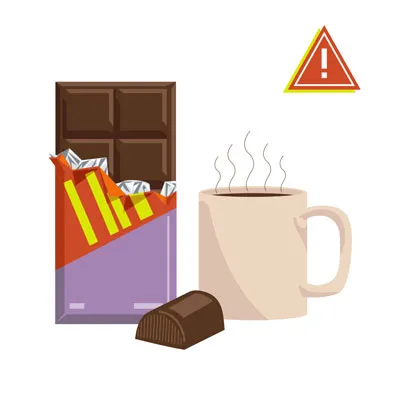 Various types of chocolate bars and candies, tempting but dangerous for dogs
Various types of chocolate bars and candies, tempting but dangerous for dogs
Chocolate toxicity is a leading cause of pet poisoning, especially during holidays. Your dog absolutely cannot eat any chocolate product. Chocolate contains a lethal compound called theobromine, with darker chocolates containing higher concentrations. Chocolate also contains caffeine, and some sugar-free varieties may even include xylitol, another substance highly toxic to dogs.
Dogs and cats cannot metabolize chocolate as effectively as humans. Dark chocolate and baker’s chocolate are the most dangerous forms, but any type of chocolate can be problematic. Symptoms associated with chocolate ingestion can include hyperactivity, vomiting, diarrhea, pancreatitis, abnormal heart rhythm, and seizures. If your dog ingests any amount of chocolate, no matter how small, contact your veterinarian immediately.
Grapes and Raisins
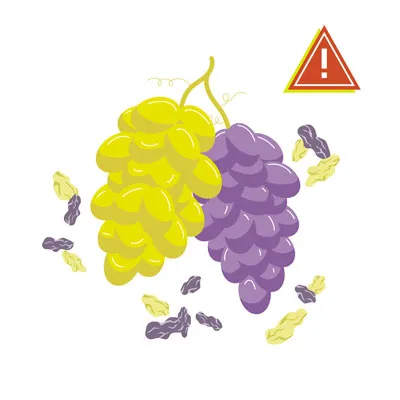 Fresh grapes on a vine and dried raisins in a bowl, both highly toxic to dogs
Fresh grapes on a vine and dried raisins in a bowl, both highly toxic to dogs
Grapes and raisins are exceptionally dangerous for dogs. These fruits can lead to severe health problems, including acute kidney failure, as their tartaric acid is toxic to a dog’s kidneys. Even a few bites can cause significant harm. Symptoms of grape or raisin poisoning include vomiting, diarrhea, loss of appetite, changes in the volume of urine passed, or complete absence of urination.
Macadamia Nuts, Almonds, and Pistachios
Macadamia nuts can cause a range of painful symptoms in dogs, such as weakness, overheating, and vomiting. While the exact mechanism of toxicity remains somewhat mysterious, these nuts are definitively considered toxic to dogs. Ingesting as few as six nuts can lead to severe poisoning in a small dog.
While macadamia nuts are the most dangerous, other nuts like pistachios and almonds can pose choking hazards or become problematic if they are flavored or spiced. Always be cautious with nuts around your canine companion.
Milk and Dairy Products
Milk and other dairy products should be evaluated on a case-by-case basis for dogs. While some dogs can consume milk or dairy without issues, others are lactose intolerant or have allergies, which can result in diarrhea and gas after consuming cow’s milk.
Ice cream is also ill-advised for dogs due to its high sugar and fat content. Instead of ice cream, consider offering frozen bites of healthy fruits that your dog can safely eat. Small quantities of lower-fat cheese can be acceptable as an occasional treat, but avoid high-fat varieties.
Mushrooms
It is always safest to exercise extreme caution and avoid feeding your dog mushrooms. Mushrooms contain a diverse array of toxins that can cause serious health issues, including kidney and liver failure, vomiting, diarrhea, hallucinations, and damage to red blood cells. While washed, white mushrooms from a grocery store might be considered safer, it is generally prudent to opt for a different type of treat.
Nutmeg and Cinnamon
Dogs should never be given foods containing nutmeg. This spice can induce hallucinations and severe vomiting. Even if your dog is begging for a treat spiced with nutmeg, resist the temptation. The harmful compound in nutmeg is myristicin, and its effects are more pronounced with higher doses or in smaller dogs. If your dog consumes any amount of nutmeg, contact your veterinarian for immediate guidance.
Cinnamon should also be avoided, not primarily due to toxicity, but because it can irritate your dog’s mouth. Additionally, it can lead to a dangerous drop in blood sugar, which can have serious health implications for your pet.
Onions, Garlic, Chives, and Leeks
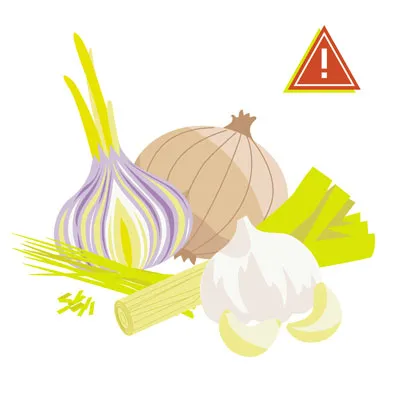 Assortment of allium vegetables including onions, garlic, chives, and leeks
Assortment of allium vegetables including onions, garlic, chives, and leeks
Many pet owners are surprised to learn that herbs belonging to the allium family—such as onions, garlic, chives, and leeks—are not safe for their dogs. Onions and garlic contain sulfoxides and disulfides, which can damage red blood cells and lead to anemia in both cats and dogs. It’s important to note that onion and garlic powders are common ingredients in many prepared human foods, even baby food, so always read labels carefully before offering any store-bought food to your pet.
All allium plants, including chives and leeks, can cause potentially fatal anemia in dogs and cats. Certain Japanese dog breeds, such as Akitas and Shiba Inus, are particularly sensitive to allium plants, but these plants pose a danger to all dogs.
Salt
Excessive salt intake can disrupt the fluid balance in your dog’s cells. Too much salt can result in tremors, seizures, diarrhea, or even a coma. Whether your dog is begging for a bite of something with rock salt, homemade play dough, or potato chips, do not let their pleading eyes compromise their health.
Spicy Food
Keep your dog strictly away from spicy foods. Hot, spicy ingredients can cause vomiting, stomach ulcers, or diarrhea, which can be extremely painful for your dog and potentially costly in emergency veterinary bills.
Sugar-Free Gum and Candy (Xylitol)
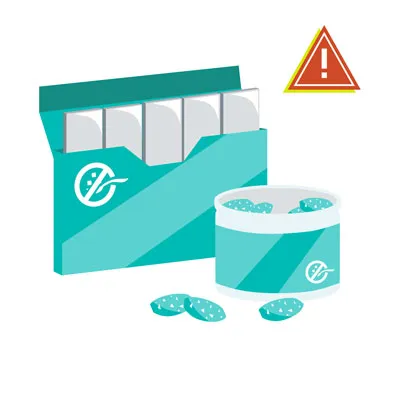 Sugar-free chewing gum and candies, containing dangerous xylitol for pets
Sugar-free chewing gum and candies, containing dangerous xylitol for pets
Xylitol is an artificial sweetener commonly found in numerous human foods, including sugar-free gum and candy. However, in dogs, xylitol can trigger a rapid and dangerous drop in blood sugar, leading to weakness and even seizures. Some dogs may also develop liver failure.
Poisoning cases involving this artificial sweetener, which is also present in many sugar-free baked goods, are on the rise. The amount of xylitol found in just five pieces of gum has the potential to be lethal to a 65-pound dog.
Tomatoes and Raw Potatoes
Tomatoes and potatoes fall into a category where some forms are safe, while others are not. A fully ripened red tomato is generally acceptable. However, the green parts of the tomato plant contain solanine, a compound toxic to dogs. Green, unripe tomatoes also contain solanine.
Potatoes follow a similar pattern. Baked or boiled potatoes without additives are generally safe in small quantities. Conversely, raw potatoes contain solanine, which is toxic to dogs.
Tobacco
Tobacco is extremely dangerous and unhealthy for your dog. Exposure to nicotine-containing products can cause a variety of symptoms, including vomiting, diarrhea, rapid or labored breathing, agitation, abnormal heart rate, wobbliness, weak muscles, high or low blood pressure, seizures, and tremors. More significant or frequent exposure to tobacco can lead to blue gums and coma, and ultimately prove fatal.
Dogs are naturally curious. They might pick up a discarded cigarette on a walk or nose through an ashtray containing cigarette butts. If your dog ingests any form of tobacco, you must act immediately and take them to a veterinarian without delay.
Yeast and Raw Dough
Yeast and raw dough are unsafe for dogs for several critical reasons. Raw dough can expand significantly in your dog’s stomach, causing severe pain and potentially life-threatening torsion or rupture of the stomach.
Furthermore, the yeast and sugar in raw dough can ferment, producing alcohol and leading to alcohol toxicity. This condition can rapidly become fatal, necessitating immediate medical intervention.
Raw Meat
Never feed your dog raw or undercooked meat. The possible presence of Salmonella or E. coli in raw meat can be harmful to dogs, just as it is to humans. Additionally, the bones in raw meat can pose a choking hazard for your dog.
Rhubarb
Rhubarb, often used in desserts, is not safe for pets. This plant contains soluble calcium oxalate crystals in its leaves. If consumed in large enough quantities, these crystals can bind with calcium in the body, causing a dangerous drop in calcium levels and potentially leading to renal failure, which can be life-threatening. Symptoms include tremors, weakness, drooling, bloody urine, changes in thirst and urination, and vomiting.
Star Fruit
Similar to rhubarb, star fruit also contains soluble calcium oxalate crystals. It is important not to let your dog snack on this fruit due to the potential health risks.
Flavored Water and Seltzer Water
It is best to err on the side of caution and always provide your dog with fresh, clean plain water instead of any flavored or carbonated beverages. Seltzer and flavored waters often contain added ingredients that can be dangerous for dogs, such as sugar or salt. While plain seltzer water might be acceptable in small, urgent situations, it can still lead to gas and bloating. Sticking to plain water is always the safest option.
13 Foods Safe for Dogs
While the list of what are foods that dogs can’t eat is extensive, there’s also a considerable list of what is good for dogs to eat human food! Some of the safest and most enjoyable human foods for dogs include very small amounts of dehydrated chicken or beef, apples (without the core), green beans, and carrots.
Here are some popular and safe foods your dog can enjoy. This list is not exhaustive but provides a great starting point.
Apples, Oranges, and Bananas
You must avoid apple cores and seeds due to their toxicity; however, the fleshy parts of apples, completely free of seeds, are perfectly fine for your dogs. It’s best to cut off a small piece of an apple to eliminate any risk of your dog ingesting the core. Oranges are safe in small quantities. In moderation, bananas (peeled) can also serve as a delightful treat.
Blueberries and Blackberries
Blueberries are a fantastic and healthy treat that your dog will likely adore. They are packed with antioxidants, fiber, phytochemicals, and vitamin C, all of which contribute positively to your pup’s health.
Cantaloupe, Mango, Peaches, Pears, Pineapples, and Watermelons
Many fruits can be safely enjoyed by your dog, so experiment to discover their favorites! Cantaloupe is an excellent choice to begin with. Your dog might also love watermelon, but ensure you remove all rinds and seeds (including pale seeds from seedless varieties) to prevent choking hazards. Since watermelon is primarily water, it can be particularly refreshing on a warm day. Mangoes, peaches, pears, and pineapples are also safe when given in moderation. Always remember to remove seeds, pits, and cores before offering these fruity treats to your dog.
Carrots, Cucumber, and Celery
Looking for more healthy options? Remember the three C’s: carrots, cucumbers, and celery. These vegetables and fruits are especially beneficial for overweight dogs due to their very low-calorie content. Bite-sized carrot pieces offer a satisfying crunch that many dogs love. Celery bites also provide a pleasing crunch and can even help combat bad breath. Cucumber slices are rich in vitamins and minerals, with minimal carbohydrates or fats.
Cheese
While dogs should generally avoid milk and most dairy products, a small amount of cheese given occasionally is acceptable, provided you know your dog is not lactose intolerant. Remember that some cheeses are high in fat, which can be dangerous for dogs, potentially leading to pancreatitis. Therefore, opt for lower-fat varieties, such as a small piece of mozzarella, or consult your veterinarian for the best type of cheese.
Eggs
Fully cooked eggs can be a tasty and beneficial treat for your dog. Scrambled eggs, in particular, can help soothe an upset stomach and provide an excellent source of protein. Knowing what can dogs eat for upset stomach is valuable for times when your pet needs a gentle diet.
Peanuts, Peanut Butter, and Cashews
Peanuts and cashews are safe for dogs when given in small quantities. However, due to their high fat content, these should only be offered sparingly as an occasional treat. Ensure they are unsalted, unflavored, and unseasoned. what can dogs eat and drink also includes peanut butter, which in moderation, is a delicious and protein-rich option for your pup. Always look for unsalted peanut butter and strictly avoid any sugar-free varieties that contain xylitol.
Popcorn and Corn
Popcorn is another delightful treat your dog might enjoy. Choose air-popped, unsalted, and unbuttered popcorn. Carefully inspect the popcorn to ensure there are no unpopped kernels, which could pose a choking hazard for your pup. Naturally, corn (removed from the cob) is also acceptable when served plain, without butter, salt, or spices.
Coconut and Honey
In small amounts, coconut is generally fine for your dog, including coconut milk and coconut oil. It contains lauric acid and may even help with allergies. However, some dogs might experience an upset stomach from fresh coconut or coconut milk, so introduce it with caution. Avoid coconut water, which is not safe for dogs. Also, do not let your dog eat the fibrous shell, as it can cause choking. Honey, in moderation, is also safe and offers numerous beneficial vitamins and minerals for your pup.
Shrimp and Fish
Plain, fully cooked shrimp is an excellent choice for your dog. Always remove the shell, head, tail, and legs, and avoid any shrimp that has been seasoned, salted, or buttered. Fish is also permissible, especially salmon and sardines. Ensure the fish is plain, fully cooked, and boneless. A good guideline is to offer fish to your dog no more than twice a week. Plain, canned tuna is safe in moderation (to prevent excessive mercury and salt intake); opt for tuna packed in water, not oil.
Turkey
Turkey meat, when prepared correctly, is healthy and safe for dogs. Always remove the skin, fat, and bones. Offer small bites of plain, unseasoned turkey as a delicious, protein-rich treat. Avoid anything seasoned or salted.
Grains, Wheat, and Quinoa
What about grains, wheat, or quinoa? Similar to corn, a small amount of wheat or other grains is perfectly fine. Quinoa is also considered a healthier option than many other fillers. Always monitor your dog for any signs of allergic reactions when introducing new grains.
Green Beans
Many dogs thoroughly enjoy green beans, whether served raw, steamed, or from a can. They are safe, tasty, and healthy—a winning combination. Choose green beans that are raw or cooked plain, without added spices, oils, or salt. Cut them into small, bite-sized pieces to prevent choking.
What Dogs Are Most at Risk if They Consume Toxic Foods?
While it is imperative to prevent any dog from ingesting toxic foods, some dogs face a higher risk due to various factors.
- Small breeds vs. large breeds: Smaller dogs are inherently more vulnerable due to their lower body weight, especially when exposed to substances like chocolate.
- Puppies: Younger dogs have less developed digestive and immune systems, putting them at greater risk from certain substances, including some raw dog foods.
- Elderly dogs: Older dogs may be at higher risk due to pre-existing health conditions. For example, dogs with other health problems should not be fed raw dog food.
- Dogs with pre-existing conditions: Many pre-existing health conditions, such as diabetes or kidney disease, can significantly increase a dog’s risk if they consume toxic foods.
How To Prevent Dogs from Eating Toxic Foods
While accidents can sometimes occur, proactive measures are essential to minimize the risk of your beloved pup consuming unsafe human food.
1. Store Foods Out of Reach
Ensure your dog cannot access any toxic food. Keep dangerous items on high shelves that are out of your dog’s reach or securely locked away in cabinets they cannot open.
2. Avoid Feeding Dogs from Your Plate
Do not feed your dog from your plate or in the kitchen while you are cooking, even if you only intend to give a small treat. It is always safest to provide your pup with treats specifically made and approved for dogs.
3. Educate Family Members and Guests
Educate all family members, including children, and any guests about the dangers of feeding human food to your dog. Make it clear that, no matter how tempting it may be, they should never sneak food to your pet.
4. Be Careful During Holidays
Exercise extra caution during holidays, as the increased activity and cooking can make it easy to let your guard down.
If, despite your precautions, your dog eats something toxic, be prepared to act quickly. Keep emergency contact information readily accessible for 24/7 emergency veterinarians, including during holidays, or for poison control services.
What To Do if Your Dog Eats Something Toxic
If your dog consumes toxic food, seek professional help as quickly as possible.
It’s vital to be familiar with the symptoms of food toxicity so you can promptly recognize if your dog has ingested something harmful. The symptoms of toxicities vary depending on what your pup consumed. These can include listlessness, distress, pain, vomiting, bloody stools, and more. Sometimes, a dog’s stomach may become bloated with gas and feel hard to the touch; this painful condition can cause the stomach to rupture if left untreated.
If you observe these symptoms, take the following steps:
- Call your veterinarian or poison control right away. Timing is critical. Treatments are typically more successful and hospitalization periods shorter if a dog receives prompt medical attention.
- Be ready with all important information, such as the specific type of food eaten, the estimated amount consumed, and the time of ingestion.
- Avoid home remedies unless specifically suggested by your veterinarian. This is because appropriate remedies can vary greatly depending on the substance ingested. Even inducing vomiting can be harmful in certain situations.
Dog Care Story: Helping You Keep Your Dog Healthy
From household toxins to dangerous foods, it can be challenging to keep track of everything your dog shouldn’t get into. Dogs don’t always have the most discerning taste! However, by following this guide and remaining vigilant, you can significantly help keep your dog safe from foods that could harm them.
The good news is that there are plenty of foods that are safe and healthy for your dog to enjoy! Discover which ones from our list your dog loves, and offer them as healthy treats when they’ve been a good boy or girl. If you are ever unsure about any food, always consult with your veterinarian.
Pet insurance is an excellent way to help protect your dog from unexpected encounters with toxins. At Dog Care Story, our comprehensive dog and puppy insurance plans can be tailored to your pet’s unique needs. Additionally, Dog Care Story policyholders have access to a veterinary expert anytime through our 24/7 Pet Helpline. This invaluable resource can be a significant help if you’re concerned about something your pet may have eaten.
References
- “Top 10 dog poisons,” Hilary Parker (5/2023), WebMD, https://www.webmd.com/pets/dogs/top-10-dog-poisons
- “What happens if a dog eats chocolate?” (10/2023), Colorado State University, https://vetmedbiosci.colostate.edu/vth/animal-health/why-is-chocolate-bad-for-dogs/
- “Fruits and vegetables dogs can or can’t eat,” (3/2024), American Kennel Club, https://www.akc.org/expert-advice/nutrition/fruits-vegetables-dogs-can-and-cant-eat/
- “What to do if your dog drinks alcohol,” Jerry Klein (7/2023), American Kennel Club, https://www.akc.org/expert-advice/vets-corner/is-alcohol-dangerous-for-dogs/
- “Can dogs eat apples?” Hector Joy (12/2022), PetMD, https://www.petmd.com/dog/general-health/can-dogs-eat-apples
- “Can dogs eat plums?” Katie Koschalk (7/2023), Chewy, https://be.chewy.com/nutrition-pet-diet-tips-can-dogs-eat-plums/
- “Avocado (Persea spp) Toxicosis in Animals,” Cristine Hayes (9/2024), Merck Veterinary Manual, https://www.merckvetmanual.com/toxicology/food-hazards/avocado-persea-spp-toxicosis-in-animals
- “People foods to avoid feeding your pets,” (n.d.), ASPCA, https://www.aspca.org/pet-care/animal-poison-control/people-foods-avoid-feeding-your-pets
- “People foods dogs can and can’t eat,” (3/2024), American Kennel Club, https://www.akc.org/expert-advice/nutrition/human-foods-dogs-can-and-cant-eat/
- “Can dogs eat nuts?” Amanda Ardente (1/2023), PetMD, https://www.petmd.com/dog/nutrition/can-dogs-eat-nuts
- “Can dogs drink milk?” Sandra C. Mitchell (1/2024), PetMD, https://www.petmd.com/dog/nutrition/can-dogs-drink-milk
- “Can dogs have nutmeg?” Barri J. Morrison (11/2023), PetMD, https://www.petmd.com/nutmeg-safe-dogs
- “Onion, garlic, chive, and leek poisoning in dogs,” Renee Schmid et al. (2024), VCA Animal Hospitals, https://vcahospitals.com/know-your-pet/onion-garlic-chive-and-leek-toxicity-in-dogs
- “Can dogs eat tomatoes?” Anna Burke (10/2024), American Kennel Club, https://www.akc.org/expert-advice/nutrition/can-dogs-eat-tomatoes/
- “Can dogs eat potatoes?” Katherine Ripley (11/2023), American Kennel Club, https://www.akc.org/expert-advice/nutrition/can-dogs-eat-potatoes/
- “What to do if your dog eats a cigarette butt,” (6/2023), American Kennel Club, https://www.akc.org/expert-advice/health/dog-ate-cigarette-butt/
- “Dough & dogs: Why it’s bad and what you can do,” Lisa Goldstein (7/2024), Preventive Vet, https://www.preventivevet.com/dogs/dough-is-toxic-to-dogs
- “Rhubarb,” (n.d.), Pet Poison Helpline, https://www.petpoisonhelpline.com/poison/rhubarb/
- “Can dogs drink carbonated water?” Heather Logue (n.d.), Rover, https://www.rover.com/blog/can-dogs-drink-carbonated-water/
- “What fruits can dogs eat?” Ellen Malmanger (2/2024), PetMD, https://www.petmd.com/dog/nutrition/what-fruits-can-dogs-eat
- “Can dogs have green beans?” Anna Burke (8/2022), American Kennel Club, https://www.akc.org/expert-advice/nutrition/can-dogs-have-green-beans/
- “About pet food safety,” (4/2024), CDC, https://www.cdc.gov/healthy-pets/about/pet-food-safety.html
